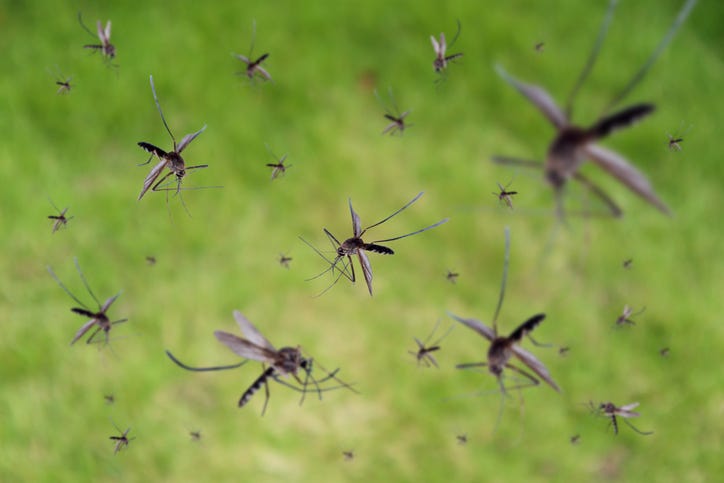
(WWJ) A mosquito-borne disease that can be deadly in humans has been confirmed in a horse in Livingston County.
Michigan Department of Agriculture and Rural Development State Veterinarian Dr. Nora Wineland said Michigan's first case of Eastern Equine Encephalitis (EEE) for 2021 is in a 2-year-old Standardbred filly from Livingston County.
Officials say EEE — a viral disease spread by mosquitoes to both humans and animals — is one of the most dangerous mosquito-borne diseases in the U.S.
EEE has a 90% rate among horses that become ill, and a 33% fatality rate among humans.
Last year, Michigan had 41 cases of EEE in animals, and four cases in humans.
In 2019, five people in Michigan died after contracting EEE.
EEE is typically seen in late summer to early fall each year in Michigan, and officials say this discovery underscores the need for precautions.
"The Livingston County horse was never vaccinated against EEE, and it developed signs of illness-including fever, lethargy, and depression-which progressed to the animal exhibiting neurologic signs and being down on the ground with an inability to get up. The horse was euthanized due to her declining condition," said Wineland. "It is critically important for horse owners to reach out to their veterinarian to discuss how to best protect their animals from this disease."
To protect your animals, measures could include the following:
- Talking to a veterinarian about vaccinating horses against EEE.
- Placing horses in a barn under fans (as mosquitoes are not strong flyers) during peak mosquito activity from dusk to dawn.
- Using an insect repellant on the animals approved for the species.
- Eliminating standing water on the property-i.e., fill in puddles, repair eaves, and change the water in buckets and bowls at least once a day.
- Contacting a veterinarian if a horse shows signs of the illness: mild fever and stumbling, which can progress to being down and struggling to stand.
People can be infected with EEE from the bite of a mosquito carrying the virus, although the disease is not spread by horse-to-horse or horse-to-human contact.
In humans, signs of EEE include the sudden onset of fever, chills, and body and joint aches. The virus can also cause severe encephalitis, resulting in headaches, disorientation, tremors, seizures, and paralysis. Permanent brain damage, coma, and death may occur in some cases.
"This equine case indicates the EEE virus is here in Michigan and provides a warning that residents could also become infected by a mosquito," said Dr. Joneigh Khaldun, MDHHS chief medical executive and chief deputy director for health. "Michigan residents are urged to take precautions and protect themselves from mosquito bites."
Residents can stay healthy by following steps to avoid mosquito bites:
- Applying insect repellents containing the active ingredient DEET (or other U.S. Environmental Protection Agency-approved products) to exposed skin or clothing, and always following the manufacturer's directions for use.
- Wearing long-sleeved shirts and long pants when outdoors. Applying insect repellent to clothing to further prevent bites.
- Maintaining window and door screening to help keep mosquitoes outside.
- Emptying water from mosquito breeding sites around the home, such as buckets, unused children's pools, old tires, or similar sites where mosquitoes may lay eggs.
- Using nets and/or fans over outdoor eating areas.
Overall, mosquito-borne illnesses, like EEE, will continue to pose a risk to both animals and humans until late fall when nighttime temperatures consistently fall below freezing, health officials say.
For more information about EEE and other mosquito-borne diseases, visit Michigan.gov/EmergingDiseases.

